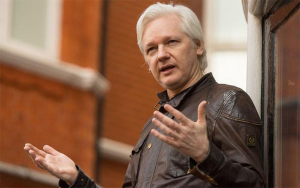Listen to this report now.
By Carlton Joseph

Few Americans -and probably Canadians -are aware that Julian Assange, founder of WikiLeaks, is still being persecuted for publishing information exposing corporate and government wrongdoing.
The US government has charged Assange with 16 counts under the Espionage Act of 1917 and one count of computer hacking.If convicted, he will face a sentence of 175 years in US prison.
President Biden has faced sustained pressure, both domestically and internationally, to drop the 18-count indictment Assange faces in federal court in Virginia, which was filed under his predecessor Donald Trump.
On Tuesday, two Judges at London’s High Court will hear his extradition case and journalists and news organizations globally are awaiting the decision because they contend that if Assange loses this appeal, it would set a dangerous precedent that will undermine the First Amendment and the freedom of the press.
In 2010, WikiLeaks published information highly incriminating to the U.S. government, including video that showed a US air crew in Apache helicopters on July 2007, slaughtering a dozen civilians in Iraq.

The dead included two Iraqis working for Reuters news agency, contradicting U.S. claims that all the dead were insurgents. Later, The New York Times, The Guardian, Le Monde, El Pais and Der Spiegel published a series of revelations in cooperation with Wikileaks, that made headlines around the globe, publishing confidential cables from the U.S. State Department, that disclosed corruption, diplomatic scandals and spy affairs on an international scale. The cables contain diplomatic analysis from world leaders, and the diplomats’ assessment of host countries and their officials, and revealed that diplomats of the U.S. and Britain eavesdropped on Secretary of State Kofi Annan, in the weeks before the US led invasion of Iraq, in violation of international treaties prohibiting spying at the UN.
The Times reported that the leaked documents told “the unvarnished story of how the government makes its biggest decisions, the decisions that cost the country most heavily in lives and money.”
On August 2012, Assange was granted asylum, and spent seven years in the Ecuadorian embassy in London because on his fears of political persecution. In 2019, hours after Ecuador’s government revoked Assange’s political asylum, British police forcibly removed him, and charged him for breaching the Bail Ac and he was placed in London’s, Belmarsh Prison.
Interestingly, President Obama rejected requests to prosecute Assange, because he believed that prosecuting Assange, without also pursuing the media outlets that published Wikileaks cables – The New York Times, The Washington Post and Guardian newspapers – was dishonest.
President Trump’s justice department, for political reasons, unsealed conspiracy charges against Assange, alleging he worked with former Army intelligence analyst whistle blower, Chelsea Manning, to hack a government computer and carry out one of the largest leaks of US classified information in history.
In a 2021 ruling, district judge, Vanessa Baraitser rejected the US request to extradite Assange to the US, citing a real and “oppressive” risk of suicide.”
Interestingly, this is the first time that the U.S. is pursuing a publisher under the Espionage Act. It alleges that Assange violated the Espionage Act by obtaining, receiving, possessing and publishing national defense information and by “recruiting sources” and “soliciting” confidential documents by maintaining a website indicating that it accepts such materials.
Importantly, this is the foundation of investigative journalism, and used by journalists to recruit and solicit sources, to receive and accept confidential information and publish it, especially when it’s in the public’s interest. This is not a crime. It is, and has been entitled to the full protection of the First Amendment. If Assange is prosecuted, the US will be setting a precedent that any journalist, anywhere in the world, could be prosecuted and extradited to the US to face prosecution for exposing the truth. This is dangerous for U.S. press freedom, and for all journalists in the United States and globally.
Weaponization of the Espionage Act would silence journalists and cause media houses to close down their news departments, because revealing crimes by the US military forces and their allies in the theatre of war, or crimes by powerful politicians, will be punishable by law.
According to the Supreme Court, a “free press cannot be made to rely solely upon the sufferance of government to supply it with information.” The court believes that democracy depends on a robust, wide-open free press, and has held that journalists are entitled to publish true and newsworthy information, even if their sources obtained or released the information unlawfully.
President Biden, who constantly accuses Trump of trying to destroy democracy, seems intent on destroying democracy, since he has completely embraced Trump’s prosecution of Assange, and is actively seeking to extradite him to the United States. Worst, he served as Vice President in the Obama administration, and understands that prosecuting Assange and not prosecuting the major media houses is deceitful, and demonstrates a bias against internet-based journalism and small media houses.
Recently, the Australian Parliament passed a motion calling for Assange, an Australian citizen, to be allowed to return to his home country.They contend that he’s an award-winning journalist and publisher, who won journalism awards globally, including the Sydney Peace Prize, for the publications that the US wants to prosecute him for sharing, and publishing with other media houses.
The National Union of Journalists, Reporters Without Borders, Amnesty International, Human Rights Watch and many other organizations openly support Assange. How could the US prosecute Assange but not prosecute The New York Times, The Guardian and others, which published the very same leaks of national security information?
The global public must stand for the principles of justice, media freedom and the rights of journalists to do their job.If we don’t, events like the death of Navalny in Russia’s prison will become normal occurrences in the US, and possibly the West.
The UN special rapporteur on torture, Alice Jill Edwards, hasnow urged the government to halt the extradition, based on fears that he would be at risk of treatment amounting to torture.
The National Union of Journalists, like Reporters Without Borders, is a firm supporter of Assange, as are many organisations, including Amnesty International and Human Rights Watch.
Attorney General Merrick B. Garland has sought to rein in ways in which the Justice Department has made it harder for journalists to do their jobs. In October, he issued new regulations that ban the use of subpoenas, warrants or court orders to seize reporters’ communications records or demand their notes or testimony in aneffort to uncover confidential sources in leak investigations
(Trinidad-born Carlton Joseph who lives in Washington D.C., is a close observer of political developments in the United States.)
The perspectives and viewpoints articulated by the columnist unequivocally do not represent or endorse the official stance or opinions of the publication.


